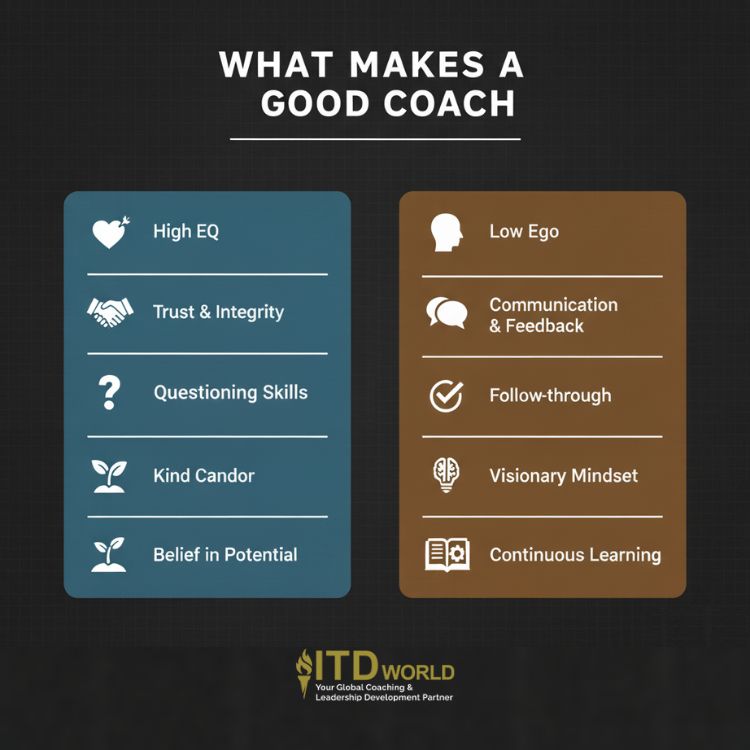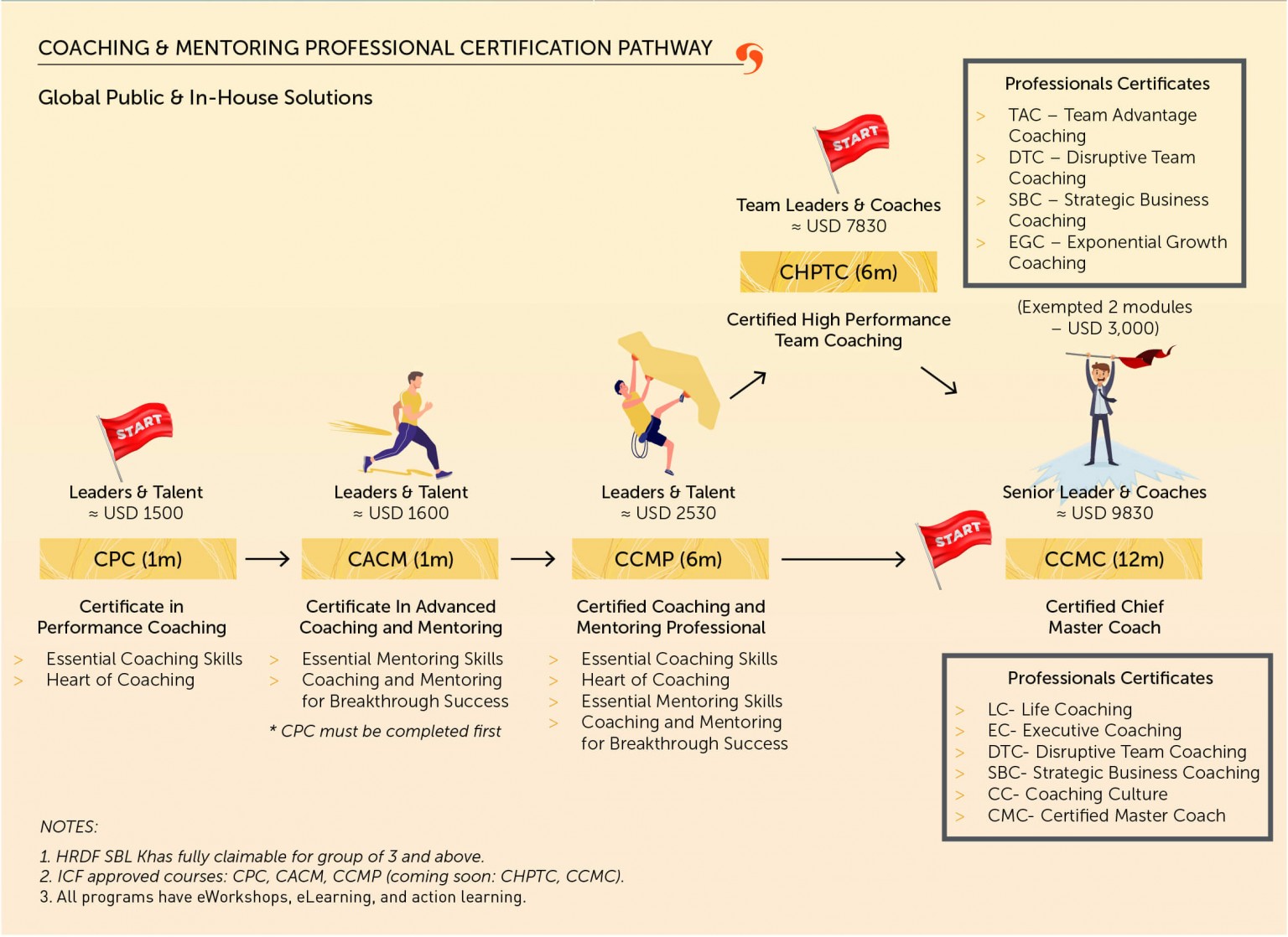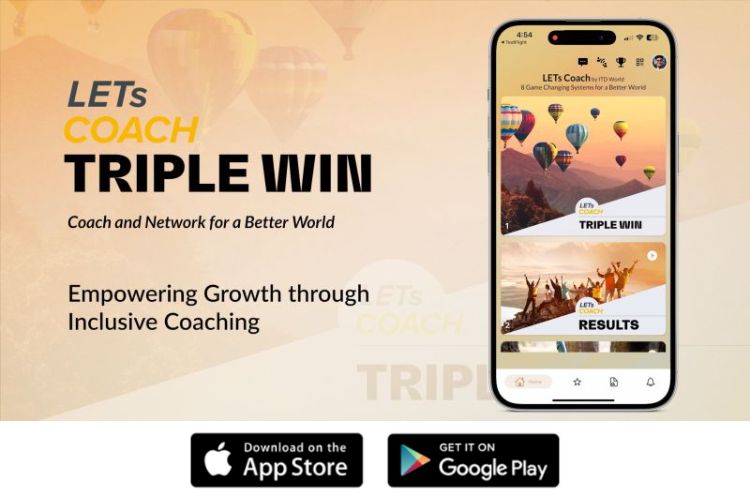Discover the characteristics of a good coach to ensure effective coaching and drive sustainable growth!
Within the recent years, coaching has become one of the most powerful tools for professional development. Yet, its effectiveness has less to do with any single technique or model – and everything to do with the personal qualities of the coach themselves. Indeed, world-class practitioners like Marshall Goldsmith have demonstrated that true coaching mastery comes from who you are, not just what you do. This article explores a list of essential characteristics of a good coach that transcend mere methodologies and truly drive impactful results.
|
Author: Jonathan M. Pham |
Highlights
- A good coach is one who possesses an interconnected system of mindsets and skills, including high emotional intelligence, trust and integrity, deep listening and powerful questioning, the ability to challenge with compassion, an unwavering belief in human potential, humility and a low ego, exceptional communication and feedback skills, a commitment to action and accountability, a visionary and inspiring mindset, and a dedication to lifelong learning.
- Continuous training, mentorship, and practice are essential for developing the above-mentioned abilities and ensuring successful, insight-driven client sessions.
10 Characteristics of a Good Coach
The qualities below are not isolated traits – but an interconnected system of mindsets and skills. They work together to create an environment of trust, insight, and action, enabling one to facilitate profound and lasting change.
-
High emotional intelligence (EQ)
Our presence is a present to the people we coach.
The foundation of effective coaching, emotional intelligence is the ability to perceive, understand, and manage one’s own emotions while also realizing and navigating those of others. It encompasses self-awareness, empathy, and a variety of social skills.
Why it’s critical: Coaching is an emotional process as much as it is an intellectual one. Having high EQ allows one to build rapport quickly, sense unspoken concerns, and remain objective and supportive without getting psychologically entangled in the client’s challenges.
In practice: Noticing a slight hesitation in the coachee’s voice when discussing a team project, a coach may gently inquire, “I sensed a slight pause there. What’s coming up for you as you talk about this?” In doing so, they open the door to a deeper, more meaningful conversation.
-
Trust & integrity
Real integrity is doing the right thing, knowing that nobody’s going to know whether you did it or not.
Oprah Winfrey
This is the coach’s commitment to creating a confidential and psychologically safe space. It is established on a foundation of strong ethics, honesty, authenticity, and a willingness to be vulnerable.
Why it’s critical: Trust is the non-negotiable price of entry for any coaching relationship. Without it, the individual will never feel safe enough to be truly open and honest, which is a prerequisite for any real transformation.
In practice: More than simply signing a confidentiality agreement, it requires the coach to be very transparent about their process, consistently follows through on their commitments, and has the integrity to say, “That’s an area outside my expertise, but I can help you find someone who can help.”

Qualities of a good coach
-
Deep listening & powerful questioning
Probably my best quality as a coach is that I ask a lot of challenging questions and let the person come up with the answer.
Phil Dixon
The core technical skill set of coaching, deep listening means hearing not just the words being said, but the underlying values, beliefs, and emotions. Powerful questioning involves asking open-ended questions that provoke new insights rather than leading the client to a predetermined answer.
Why it’s critical: A coach’s primary role is not of an expert providing answers, but of a facilitator – who is here to enable the client to discover their own solutions. This is achieved almost entirely through listening and questioning.
In practice: Instead of asking a closed, advice-giving question like, “Have you tried talking to your boss?”, a great coach would say something like, “If you were to have the most productive conversation possible with your boss about this, what would that look like?”
Read more: Mastering Active Listening – Essential Skills for Success
-
The ability to challenge with compassion
A coach is someone who can give correction without causing resentment.
John Wooden
A great coach does more than just support; they challenge. This is the sophisticated skill of pushing an individual beyond their self-imposed limits, questioning their assumptions, and holding a mirror up to their self-defeating patterns – all while maintaining a foundation of empathy and positive regard.
Why it’s critical: Meaningful growth happens at the edge of our comfort zone. As such, a coach must have the courage to go there with their client in a way that feels supportive, not judgmental.
In practice: A client might repeatedly say, “I’m just not a strategic thinker.” After listening, a coach should compassionately respond, “What evidence do you have that this label you’ve given yourself is 100% true? Tell me about a time you did think strategically, even on a small scale.”

Characteristics of a good coach
-
An unwavering belief in human potential
The greatest good you can do for another is not just share your riches, but reveal to them their own.
Benjamin Disraeli
A hallmark of a great coach’s mindset, it involves the fundamental belief that people are naturally creative, resourceful, and whole – that they already possess the capacity to solve their own problems and realize their goals.
Why it’s critical: Such belief is contagious. When a coach genuinely has faith in their client’s potential, the latter will start to believe in it too. It shifts the entire dynamic from “fixing a problem” to “unlocking potential.”
In practice: When a client feels stuck and defeated, the coach’s role is not to “rescue” them. Instead, they hold up a mirror to the client’s own strengths and past successes, reminding them of their resourcefulness by saying, “You’ve navigated tough challenges before. What strengths did you use then that you could draw upon now?”
Read more: 30 Coaching Principles for Breakthrough Results
-
Humility & a low ego
It’s an interesting equation: Less me + More them = Success.
Marshall Goldsmith
A coaching session is entirely about the client, not about the coach’s own cleverness or expertise. As such, a great coach has the confidence to be humble, suppressing their ego to create space for the client to be the hero of their own story.
Why it’s critical: An ego-driven coach will be tempted to give advice to show how smart they are or take credit for the client’s breakthroughs. However, the truth is that real empowerment only comes when the client discovers their own path.
In practice: It’s all about sharing the spotlight. When the individual comes up with a breakthrough idea, instead of responding with something like, “I’m glad I could help you see that.” the coach should say, “That’s a powerful insight. What did you do to arrive at that clarity?”. In doing so, they enable the coachee to take full ownership of their success.
Read more: Ego in the Workplace – The Hidden ‘Evil’ Behind Team Dysfunctions

Core values of a coach
-
Exceptional communication & feedback skills
The delicate balance of mentoring someone is not creating them in your own image, but giving them the opportunity to create themselves.
Steven Spielberg
While powerful questioning is key, a coach must also be adept at sharing their own perspective when invited or when offering a direct observation. As such, they need to demonstrate the ability to synthesize complex ideas and articulate observations clearly, concisely, and constructively.
Why it’s critical: A coach often acts as a mirror, reflecting a client’s patterns back to them. The ability to do this artfully, without judgment, is what creates “aha!” moments.
In practice: Realizing a recurring pattern in their client’s language, one may offer a simple, yet powerful remark as follows: “I’ve noticed that every time you talk about your new project, you use words like ‘have to’ and ‘must,’ but when you talk about your passion for music, you use words like ‘get to’ and ‘enjoy.’ What does that difference tell you?”
Read more: Giving Effective Feedback – A Practical Guide for Success
-
A commitment to action & accountability
If it doesn’t challenge you, it won’t change you.
Fred DeVito
A great coaching session does not just end with a list of interesting ideas; what it needs to generate is clear commitments. A coach should be dedicated to enabling their client to move from insight to meaningful action in the real world.
Why it’s critical: Without action and accountability, coaching will become a cycle of pleasant but unproductive conversations. Real change only happens when insights are translated into concrete behaviors.
In practice: At the end of a session, after a client has had a breakthrough, the coach will always facilitate the next step by asking, “So, based on this insight, what will you do?” They help the client define a specific, measurable, and time-bound action plan. Then, in the next meeting, they may ensure accountability by starting with, “Tell me about the action step you committed to last time.”
Read more: Why Follow Up is Crucial to Behavior Change & Leadership Effectiveness

Characteristics of a good coach and mentor
-
A visionary & inspiring mindset
A good coach will make his players see what they can be rather than what they are.
Ara Parseghian
This is the coach’s ability to help a client see a bigger, more inspiring future for themselves than they currently realize. It’s about expanding the latter’s sense of what is possible.
Why it’s critical: People often seek coaching because they are stuck in their current reality or feel limited by their circumstances. As such, a great coach should do their best to help them lift their gaze to the horizon, which creates the pull of motivation needed to do the hard work of change.
In practice: When an individual is bogged down in the details of a problem, a coach might prompt them to envision the future, “Let’s fast forward one year. Imagine you have completely navigated this challenge successfully. What does your professional life look like then? What are you most proud of?”
Read more: Inspirational Leadership – Igniting Passion & Purpose in Your Team
-
A “growth mindset” & dedication to lifelong learning
A coach should never be afraid to ask questions of anyone he could learn from.
Bobby Knight
Last but not least, a world-class coach embodies the very principles they seek to instill in their clients. They are a dedicated lifelong learner, constantly honing their craft and staying open to new ideas and feedback.
Why it’s critical: The coaching profession is constantly evolving. As such, one is never a “finished product.” A strong commitment to one’s own growth ensures their skills stay sharp – and that they are always bringing the best possible practice to their clients.
In practice: A great coach regularly engages in their own professional development. They work with a mentor coach or a supervision group, read widely, and seek new tools and perspectives to better serve their clients. They don’t just teach a growth mindset; they live it.
Read more: A Coach Still Needs A Coach

Characteristics of a good coach in the workplace
FAQs
How important is coaching to leadership & workplace performance?
Coaching is one of the most effective tools for modern leadership development. It directly impacts performance by increasing a leader’s self-awareness, improving their decision-making, and enhancing their ability to communicate and motivate their teams. For the organization, this translates into higher employee engagement, lower turnover of key talent, and improved overall business results.
Can anyone become a great coach?
While some people may demonstrate a more natural disposition for skills like empathy and listening, the core characteristics of a great coach are skills and mindsets that can be cultivated. Very few people are “natural” coaches without training. Becoming a great coach requires a deep commitment to learning the craft, mastering ethical standards, and engaging in continuous practice and self-reflection.
With the right guidance and dedication, any leader can become an effective coach!

What are the characteristics of a bad coach?
A bad coach tends to display the opposite of the above-mentioned ten core characteristics. Some of the most common signs include:
- Talking more than they listen.
- Giving constant advice instead of asking questions.
- Making the session about their own ego or expertise.
- Lacking clear boundaries or breaking confidentiality.
- Being judgmental instead of curious and supportive.
- etc.
Read more: Weak Leadership – How Bad Leaders Undermine Success
What makes a good coaching session?
A successful coaching session is not just a pleasant conversation; it needs to have a clear outcome. Generally speaking, the three hallmarks of a good one are:
- The client does most of the talking and thinking.
- The client has a new insight or “aha!” moment – they see their challenge or themselves in a new light.
- The client leaves with a clear, self-generated action step they are committed to taking before the next meeting.
How do I find the right coach?
Finding the right coach is a critical decision. It is recommended that you look for three key things as follows:
- Certification and training: Ensure they have been professionally trained and certified by a reputable, globally recognized body like the International Coaching Federation (ICF).
- Relevant experience: Ideally, you should prioritize one who has experience working with individuals in your industry or with similar challenges.
- Good chemistry: Most importantly, have a “chemistry session” before committing. You should feel a sense of trust, safety, and rapport. This partnership is deeply personal, and the right fit is essential.
How do I become a better coach?
- Get professional training: Enroll in a certified coaching program to learn the core competencies and ethical standards.
- Find a mentor coach: Work with an experienced master coach who can provide feedback on your coaching and help you grow.
- Practice consistently: The more you coach, the better you will become. As such, you should make it a priority to actively seek feedback on your coaching practice to identify your strengths and areas for improvement.
Read more: Coaching Philosophy – How to Craft One That Defines Your Impact

Characteristics of a good coach
What Makes a Good Coach Quotes
Check out more coaching quotes here!
A good coach can change a game. A great coach can change a life.
John Wooden
Coaching is unlocking a person’s potential to maximize their growth.
John Whitmore
Coaches have the power to change lives by fostering resilience and instilling a never-give-up attitude.
Angela Duckworth
The greatest coaches aren’t just game changers, they are life changers.
Tony Dungy
Coaching is not just about how to do something; it’s about how to be someone.
Esther Derby
The best coaches don’t just teach skills; they build character.
Pat Summitt
If you want to change your life you have to raise your standards.
Tony Robbins

Become a World-Class Coach with ITD World
At ITD World, we pride ourselves on being a global leader in certifying the next generation of professional coaches and leaders. Our programs provide the core skills, proven tools, and ethical grounding one needs to coach with confidence, credibility, and profound impact. We offer a complete pathway for your coaching journey, from foundational skills to the highest level of mastery.
Our suite of solutions includes:
- Certified Coaching & Mentoring Professional (CCMP): Our flagship, ICF-accredited program is internationally recognized and designed to equip you with the essential competencies and frameworks of professional coaching, providing a solid foundation for your practice.
- Certificate in Performance Coaching (CPC): For professionals focused on driving tangible business results, this specialized program provides the tools to enhance team performance, productivity, and goal achievement through a coaching approach.
- Certified Chief Master Coach (CCMC): For experienced coaches and senior leaders seeking to achieve the pinnacle of the profession, our CCMC program offers an elite development path to world-class mastery.
- One-on-one executive coaching: For those who wish to experience the transformative power of a personalized coaching partnership firsthand, our experienced experts should be able to help accelerate your own personal and professional journey.
Ready to embody the characteristics of a world-class coach? Contact ITD World today to learn more about our globally recognized certification programs and find the right path for you!
Other resources you might be interested in:
- Coaching Culture: Blueprint for Organizational Growth
- Team Coaching: Guidelines for High Performance
- 10 Common Coaching Challenges: Navigating Difficult Scenarios
- Self-coaching: A Practical Guide to Being Your Own Coach
- Leadership Values: 10 Qualities for Exceptional Results



